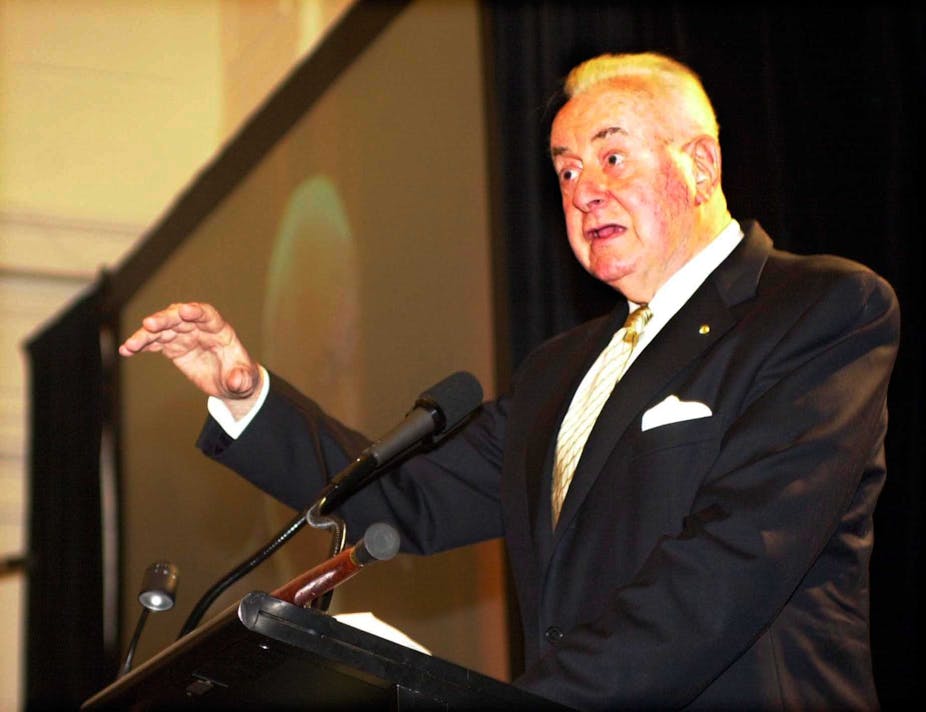In a playful rhetorical flourish at the Sydney Town Hall on Wednesday, Indigenous leader Noel Pearson monumentalised Gough Whitlam’s prime ministerial legacy, Monty Python-style:
What did the Romans ever do for us?
Whitlam’s Romanesque bequest was amply uttered by Pearson and the other big Australian voices invited by the Whitlam family to publicly memorialise the life and service of Australia’s 21st prime minister.
Whitlam left office nearly 40 years ago. That day, something else distinctly Roman boomed through “The People’s Hall” and out across the town square of modern Australia.
As if young Cicero had taken up the conductor’s baton, Whitlam’s eulogists rose to his instruction in the ancient and still exigent business of oratory. Their task was to deploy the rhetorical canon of memory to construct a mighty aural memorial.
If we can resist the lure of cynicism and partisanship. If we can allow the decent people in public life, no matter their stripes, a brief warm reprieve from the chilly, unforgiving stage. If we can be thankful that at least the boos, cheers and ovations signal an honest, though unfiltered, civic engagement.
If we can give even the “old man” himself a break from the immense weight of acclaim, we open up a space to hear the larger, freer story the Whitlam orators tell of a nation and its people through the memories of one prodigious individual. In Pearson’s words:
Raised next to the wood heap of the nation’s democracy, bequeathed no allegiance to any political party, I speak to this old man’s legacy with no partisan brief.
Memoria speaking to the present and future
Memoria in the classical rhetorical treatises was concerned with the revered discipline of impeccable memorisation, and with the locales, images and icons that serve as storehouses and mnemonics to natural human memory. Alas, the said discipline has suffered a great deal over the last couple of thousand years. Yet prompts of people, place, poetry and melody abounded in Wednesday’s proceedings.
Like memory itself, the notion of memoria is supple. Enter the Common Era and a Judaic kind of remembering emerged: one that is not a call to preserve, but to act, in the present, for the future; the essence of deliberative rhetoric. Memory scholar Mary Carruthers, Professor of Literature at New York University, writes that:
The matters memory presents are used to persuade and motivate, to create emotion, to stir the will.
Beyond the personal and the partisan, the Whitlam orators “drew out” the memories they were charged with. Rather than assign them to an old Australia, static and gleaming behind velvet cordon, they gathered and recollected and re-imagined them for us now. Accounts of past travails resounded in present struggles and aspirations: different names and places; timeless human emotions and desires.
Whitlam’s speeches “gave the Aboriginal people hope”, said Wiradjuri elder, Aunty Milly Ingram.
Australian actress Cate Blanchett, who “was but three when he passed by” (alluding to Robert Menzies’ 1963 homage to the Queen), expressed her sadness at the loss of a man whose initiatives ensured that she would be:
… the product of an Australia that engages with the globe and engages honestly with its history and its Indigenous people.
Timeless truths outlast fad of the new
Pearson observed that a four-decade-old policy program that promoted equality, indigenous participation and opportunity and advancement for all Australians was:
… as fresh as it was when first conceived. It could scarcely be better articulated today.
Senator John Faulkner declared Whitlam’s achievements to be:
… undeniable proof of the power of politics wedded to principle; of the capacity of government to change our nation for the better, and forever.
And in concluding his eulogy, Whitlam’s eldest child, Federal Court judge Antony Whitlam, QC, gave gentle reassurance:
The road ahead may be tortuous and difficult for all Australians, but we need not be divided on partisan lines.
These appeals betray a profound gratitude for Whitlam’s unqualified rage against inequality and discrimination. Pearson again:
Without this old man the land and human rights of our people would never have seen the light of day.
They are also a clarion call to maintain that rage above the political fray. In words that were certainly meant for today, Whitlam’s long-time speechwriter, dear friend and comrade, Graham Freudenberg, vehemently cautioned:
Optimism, enthusiasm, confidence against fear, prejudice, conformity – that is his enduring message to the men and women of Australia, never more than now.
Public oratory remains a critical instrument of democratic governance to those who know and can mobilise its power.
Former Australian prime minister Paul Keating — who was present and quoted more than once at Whitlam’s memoriam — has for decades spoken of the need for leaders to articulate the nation’s big story.
These stately acts of public remembering can, if we can let go of partisan lines, play a crucial part in accessing public memory, motivating ideas and debate about the nation’s present and future, and reshaping the national story. To quote Whitlam’s watchword:
Contemporary relevance, comrade.

